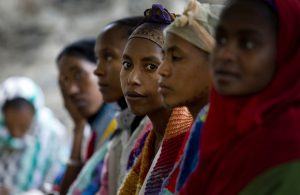 Kathleen Banks, Ali Karim, Hannah Ratcliffe, Wuleta Betemariam and Maternal Health Task Force (MHTF) Director Ana Langer recently published a paper in Health Policy and Planning titled, “Jeopardizing quality at the frontline of healthcare: Prevalence and risk factors for disrespect and abuse during facility-based childbirth in Ethiopia.” The paper presents findings from a project that the MHTF undertook in collaboration with John Snow International’s Last Ten Kilometers project in Ethiopia to measure, facilitate discussion and drive interventions to prevent disrespect and abuse (D&A) during childbirth.
Kathleen Banks, Ali Karim, Hannah Ratcliffe, Wuleta Betemariam and Maternal Health Task Force (MHTF) Director Ana Langer recently published a paper in Health Policy and Planning titled, “Jeopardizing quality at the frontline of healthcare: Prevalence and risk factors for disrespect and abuse during facility-based childbirth in Ethiopia.” The paper presents findings from a project that the MHTF undertook in collaboration with John Snow International’s Last Ten Kilometers project in Ethiopia to measure, facilitate discussion and drive interventions to prevent disrespect and abuse (D&A) during childbirth.
Women’s reported experiences
Among the sample of approximately 200 women who were interviewed after giving birth at one of the health centers, 21% reported experiencing at least one category of D&A. The most commonly reported types of D&A were non-consented care (18%), lack of privacy (15%) and non-confidential care (14%).
The frequencies of each category varied across the four different health facilities. Delivery time, travel time of one to two hours and maternal complications were among the factors significantly associated with likelihood of reporting D&A. Notably, the study found that women who experienced any complications or whose newborn faced any complications were over 15 times more likely to report any D&A than women who did not. According to Banks, “We anticipated an association between complications and reporting D&A—however, the magnitude of the relationship was surprising. Also unexpected was that weekend delivery, which is often associated with lower quality care, was protective against reporting D&A.”
Researchers’ observations
Consistent with previous findings, the researchers observed substantially higher frequencies of D&A during interactions between health care providers and women than those reported by women in the survey. For example, during more than 80% of the observed deliveries, the provider did not introduce him/herself to the woman in the antenatal ward or the woman was not asked about her preferred birth position. During more than half of the observed deliveries, the woman did not consent to her first vaginal examination, she was not covered during delivery, there were no partitions separating beds for the first examination or the partitions were not closed during delivery. In over a third of observed interactions, the mother’s history was taken or shared when others could hear, or the mother was not called by name.
Implications for future work
Comparing women’s reports of D&A with the researchers’ direct observations underscores the complexities of measuring and contextualizing D&A. This study demonstrates the importance of recognizing and addressing methodological differences in efforts to measure the prevalence of D&A.
The authors offer insight that can apply to settings outside Ethiopia: “Addressing D&A in health centers in Ethiopia will require a shift in priorities towards improving the experience and quality of care, a sustained effort to improve health care centers’ infrastructure and greater support of the rural health workforce.” Indeed, to ensure respectful maternity care for every woman everywhere, we must empower women in demanding adequate care and support health systems in supplying it.
—
Read the full paper: Jeopardizing quality at the frontline of healthcare: Prevalence and risk factors for disrespect and abuse during facility-based childbirth in Ethiopia.
Explore resources related to respectful maternity care.
Read more about measuring the prevalence of disrespect and abuse during childbirth.
Learn more about the Hansen Project on Maternal and Child Health.
Photo credit: “GOVERNOR GENERAL AUSTRALIA AFRICA TOUR” © 2009 Department of Foreign Affairs and Trade, used under a Creative Commons Attribution license 2.0
